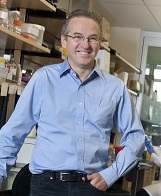Skip to content. | Skip to navigation
Personal tools

- Contact Us |
- Seminars |
- Donate

Lunenfeld-Tanenbaum
Research Institute
Mount Sinai Hospital
Joseph & Wolf Lebovic Health Complex
6-1004 - 25 Orde St.
Toronto Ontario
M5T 3H7
Tel.: 416-586-4800 ext.3246
► Web of Science Researcher ID
G-6465-2013
Dr. Andras Nagy
SENIOR INVESTIGATOR
In 2005, Dr. Andras Nagy established the Canada's first, and to date only, human embryonic stem cell lines. In 2009, Dr. Nagy reported the discovery of a new non-viral method of creating stem cells from other cells of the body that could lead to possible cures for devastating diseases including spinal cord injury, macular degeneration, diabetes and Parkinson's disease. In 2014, he led Project Grandiose, an international effort to map the genomic and proteomic pathways during de-differentiation of induced pluripotential stems cells.
Previous approaches to establish stem cells from adult cells required the use of viruses to deliver the required genes, a method that carries the risk of damaging the DNA. Dr. Nagy's method not only does not require viruses but the stem cell transgenes necessary for the process of reprogramming can be seamlessly removed after they created stem cells. Therefore this method overcomes a major hurdle for the future of safe, personalized stem cell therapies in humans. Dr. Nagy's new method of generating stem cells does not require embryos as starting points and could be used to generate cells from many adult tissues such as a patient's own skin cells.
Dr. Nagy's research is a huge step forward on the path to new stem cell-based therapies and indicates that researchers at the Lunenfeld are at the leading edge of regenerative medicine. Regenerative medicine enables the human body to repair, replace, restore and regenerate its own damaged or diseased cells, tissues and organs.
Joining Mount Sinai Hospital in 1988, Dr. Nagy has been involved in mouse embryonic stem cell research since its early days. His research resulted in an important development in cancer research in 1996 that provided a new tool for researchers and pharmaceutical companies to test new and existing treatments for cancer.
Dr. Nagy has developed a broad spectrum of genomic technologies now used around the world. These technologies assist the study of gene function in development and disease, and are important tools in the development of stem cell based therapies. By using technologies to direct gene expression, scientists will gain control of stem cell behaviour, propagation and differentiation, which will be essential if stem cells are to be used to treat human disease.
With respect to future clinical use of these stem cells, the existence of mutant cells still introduces a significant risk of unexpected behaviour after cell transplantation, including the possibility of cancer formation. Recently, Dr. Nagy and his team found that the early phase of the reprogramming process for induced Pluripotent Stem (iPS) cells is the root cause of acquired mutations. Dr. Nagy and his lab are currently trying to protect the integrity of the genomic DNA of iPS cells during the reprogramming process by ensuring the safety of stem-cell-based therapies before they can be brought to clinical therapies and treatments.
At a Glance
Dr. Andras Nagy researches stem cells, tissue engineering and regenerative medicine
Discovered a new method to create pluripotent stem cells (cells that can develop into most other cell types) without risk of disrupting healthy genes
Established Canada's first human embryonic stem cell lines
He has also developed a broad spectrum of genomic technologies now used around the world
Dr. Nagy is the Canada Research Chair in Stem Cells and Regeneration
He was the only Canadian selected for the first annual Scientific American Top 10 Honour Roll in 2009
Major Research Activities
The Nagy laboratory is interested in using mouse genetics to study mammalian development and to apply this knowledge to human disease. Dr. Nagy is also developing new, powerful tools for genetic approaches and phenotype analysis for these ongoing studies. More recently he became interested in the biology of human pluripotent stem cells, such as embryonic stem cells and induced pluripotent stem cells.



